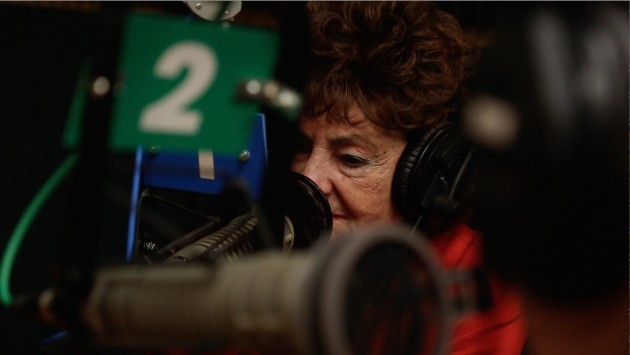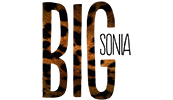
My husband and I were in Shanghai recently (at a few international schools) screening our last film (FINDING HILLYWOOD) and showing a clip from our new film in production, BIG SONIA. Halfway though the clip you see the number tattooed on Sonia’s forearm as she’s arranging scarves in her tailor shop. When the clip was over we asked students to raise their hands if they knew what the tattoo meant. We were shocked when less than 50% of the students raised their hands. We asked, “How many people know what the Holocaust was?” and we got the same response – glazed over stares and silence. One 15-year-old boy said, “It’s that Jewish thing, right?”
Although this response to our film was disappointing, we left that school with a renewed sense of purpose and validation to tell Sonia’s story now, before all of the Holocaust survivors are gone. This year marks the 70th anniversary of Sonia’s liberation from Bergen-Belsen and her 90th birthday in November – so it’s a BIG year.
Sonia Warshawski has an incredible story.
As a teenager she watched her mother go to the gas chamber and survived three concentration camps by using what she calls her “sixth sense.” On liberation day she was shot through the chest, and the bullet missed her heart by an inch – miraculously she survived. She’s currently the only living survivor in Kansas City who talks about her wartime experience in public – to churches, schools, prisons – and anyone who will listen.
Sonia’s kitchen table is covered with hundreds of hand-written thank-you notes from the middle and high-school students she speaks to. One says, “My mom and I never really get along. But after I listened to you speak, I realized that I should treat my parents better. Thank you for changing my life.” In addition to speaking engagements around KS, Sonia drives herself to work six days a week at her late husbands tailor shop, where there’s always a steady stream of customers (of all ages, races, and cultures) waiting to see her. They bring their tailoring, but they also come for the “experience” and for Sonia’s stories. Knowing Sonia – even for 10 minutes – puts things in perspective.
But Sonia didn’t always speak about the Holocaust so openly. Growing up, I remember seeing the tattoo on her arm and wondering what it meant. Sonia immersed herself in her tailor shop after her husband died and I remember going to visit her at work. She would make my sister and I try on all her scarves and feed us strange Polish candies, but we never spoke that much about her past. The shop became her “reason for being” and since she’s a “people person” it was a perfect way for her to stay connected and busy.
As one of the last survivors, Sonia is passing her legacy on by describing her tragic and horrific past, and asking people to be better.
Then, about 10 years ago, my aunt Regina (Sonia’s eldest daughter) researched our family history and put together a PowerPoint presentation that described the chronology of Sonia’s past with timelines and photos. At the same time, Sonia was starting to feel like the world has not changed much since her teenage years – there is still bullying, discrimination, and hate – and she was extremely frustrated. She decided that it was time to tell her story as a witness in hopes that the younger generation will learn from the past to make the world better for the future. Now, Regina and Sonia give a joint presentation that is in very high-demand.
As one of the last survivors, Sonia is passing her legacy on by describing her tragic and horrific past, and asking people to be better. Over the course of filming for BIG SONIA during the last few years, we have been able to film the impact Sonia has in the world. One student we’ve been following for three years (since the first time she heard Sonia speak) has recently decided to start her own foundation to combat bullying and discrimination in schools. This is the impact we were hoping for!
Sonia is a unique woman in a dying generation, and making a film about her has allowed me to get to know her in a completely different and more genuine way than I ever imagined. She’s a wounded healer who I’m proud to call my grandmother.
About This Contributor
 Leah Warshawski is a freelance producer/director with experience filming in more than 30 countries around the world. She started working in the film industry after college, in Hawaii, working on the water for major motion pictures and television shows including LOST, SURVIVOR, and HAWAII. Her debut feature documentary about the Rwandan film industry, FINDING HILLYWOOD (2013), screened in over 60 film festivals and won 6 awards. Leah serves on film festival juries and is co-founder of rwandafilm.org, a job site for East African filmmakers. For more info and recent projects, please visit Inflatable Film.
Leah Warshawski is a freelance producer/director with experience filming in more than 30 countries around the world. She started working in the film industry after college, in Hawaii, working on the water for major motion pictures and television shows including LOST, SURVIVOR, and HAWAII. Her debut feature documentary about the Rwandan film industry, FINDING HILLYWOOD (2013), screened in over 60 film festivals and won 6 awards. Leah serves on film festival juries and is co-founder of rwandafilm.org, a job site for East African filmmakers. For more info and recent projects, please visit Inflatable Film.

